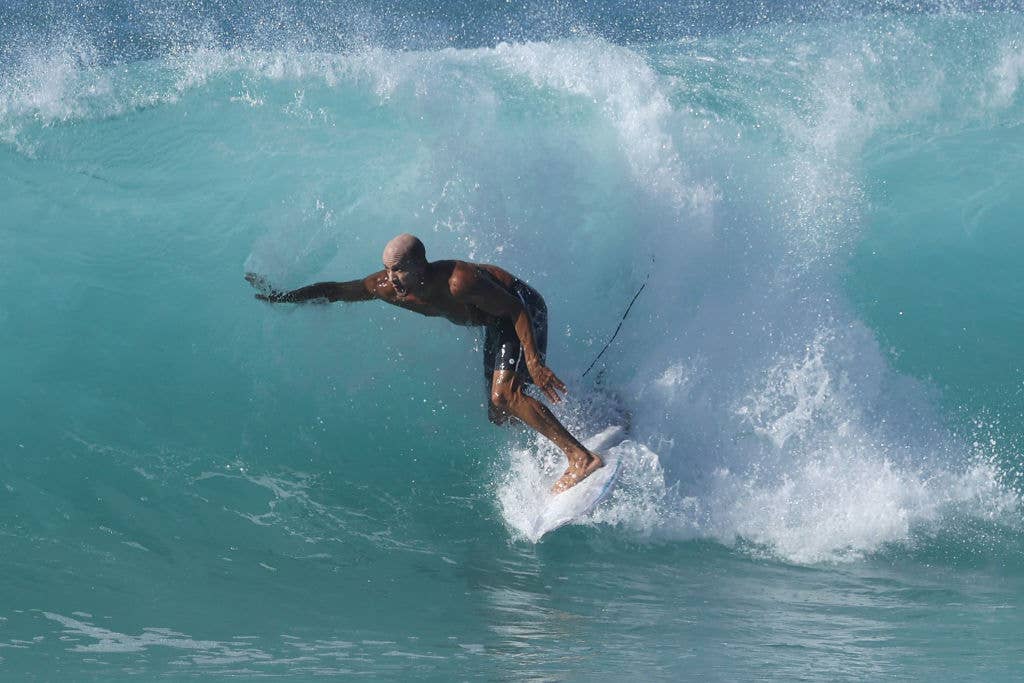
Here’s How Pro Surfer Kelly Slater is Helping to Free the Whales
Pro surfer Kelly Slater took to Instagram Live last week for a conversation about Bitcoin and cryptocurrency that segued into a surprising call-to-action to save two whales in captivity.
"In Bitcoin...there’s ‘whales’ [a name for those] who own lots of Bitcoin," Slater started out, digressing from the topic at hand. "And I’ve been super vocal about being anti-captivity of orcas and dolphins, and any kind of belugas ... whales and dolphins,” added Slater, seamlessly transitioning from crypto to marine animal welfare.
Slater revealed that one of his key motivations for the IG Live with his guest, Jack Mallers, founder and CEO of Strike, a crypto-based transfer app, was to try to leverage the new tipping functionality on Strike Tips to fund an anti-captivity whale-rescue mission. “A big part of this project for me is I want to raise awareness around the whales,” Slater said.
The world champion surfer and entrepreneur is exploring new ways to fund The Whale Sanctuary Project, which is working to free two whales in captivity. “We want to get these whales freed and back to their native waters,” Slater explained. “Ultimately [The Whale Sanctuary Project] needs to raise about $14 million for a facility.”
The whales are Lolita and Kiska. Lolita is a 53-year-old whale at Seaquarium, a marine entertainment park in Miami, who has lived most of her life in captivity. She was captured at the age of 4 back in 1970 off the coast in the Pacific Northwest and sold to Miami Seaquarium. She is said to be the longest-living whale in captivity.
Kiska, is a 44-year-old whale at MarineLand in Niagra Falls, Ontario, Canada. “Kiska has been alone in a small tank for 11 years,” explained Slater. Her five babies died in captivity, leaving the highly social creature in isolation. “There are also 40 belugas at that park. I just think this is a crime.” Heartbreaking footage emerged last month of Kiska banging her head against the glass tank, a sign of distress.
The Whale Sanctuary Project nonprofit is on a laser-focused mission to free marine life from captivity. “Our vision is of a world in which all cetaceans (whales, dolphins, and porpoises) are treated with respect and are no longer confined to concrete tanks in entertainment parks and aquariums,” The Whale Sanctuary Project website reads. “Already, we are witnessing a fundamental change in public opinion regarding how people relate to whales and dolphins...Increasingly, the global community shares our commitment to a time when all captive cetaceans have been retired to coastal sanctuaries.”
The nonprofit currently has a location for the whale sanctuary in Port Hilford, Nova Scotia, Canada, which is being designed to relocate captive whales, but also to serve as a model for sanctuaries that can then be built all over the world in the years to come. “There are already hundreds of authentic land-based sanctuaries all over the world: for elephants, big cats, bears, great apes, and many other animals. It is time to do the same for whales and dolphins,” says the nonprofit.
“If people could [also] put pressure on MarinaLand up in Canada, and get this animal back in the ocean,” Slater said.
This is not the first time Slater has spoken up for the whales and spoken out against marine animal parks; he’s been a long-time advocate of marine animal welfare and previously spoke on behalf of PETA to urge SeaWorld to release its captive animals.
On Slater’s IG Live, Dan Bitzer, a professional poker player, and businessman made an impromptu appearance to drop an idea about leveraging NFTs to help raise money for The Whale Sanctuary Project.
While Slater and his savvy technologist friend go to work on leveraging crypto-related tech to help save the whales—which we hope comes to fruition—you can donate at The Whale Sanctuary Project.
For more great content about animals and our planet, check out The Beet's environmental articles.
More From The Beet






